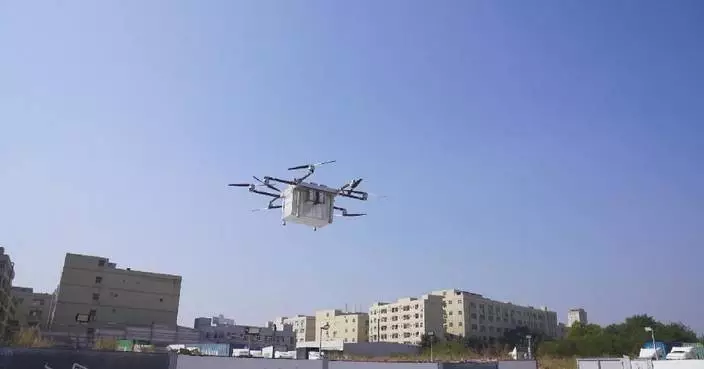Feature · News

Int'l politicians, scholar condemn Japanese PM's erroneous remarks on Taiwan

Anti-ICE nationwide protests in photos
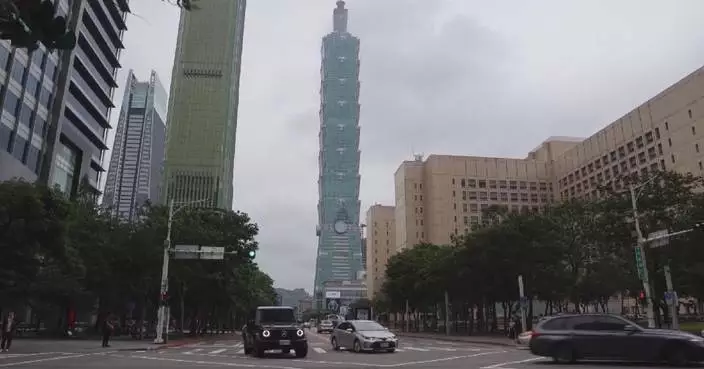
China vows effective punishment against Taiwan separatists
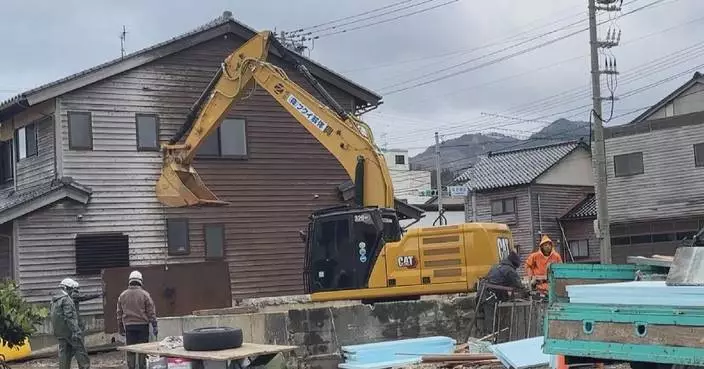
Two years on, Japan's Noto Peninsula still struggles with earthquake recovery
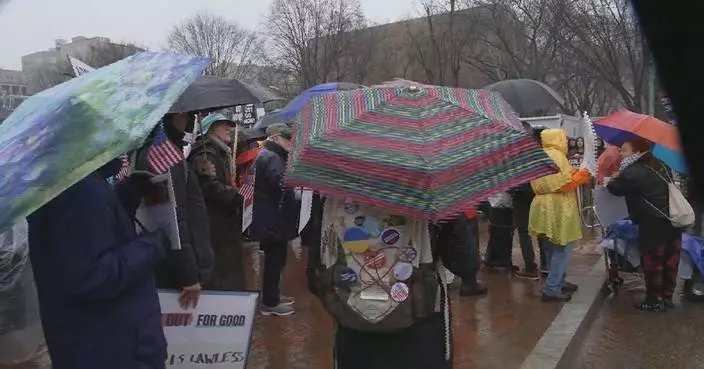
Nationwide protests erupt in US after ICE shootings

Myanmar holds second round of voting in first general election since military takeover

Former US official denounces American military action against Venezuela as illegal, violation of international law

BP China Insight : Maduro Kidnapped—Lai Ching-te Immediately Withdraws Taiwan Independence Bill in Panic

Central Japan's Wajima continues slow path toward reconstruction 2 years after earthquake

UN chief calls for respect for international law in response to Trump’s remarks

Nepalese royalists demand monarchy restoration ahead of March elections
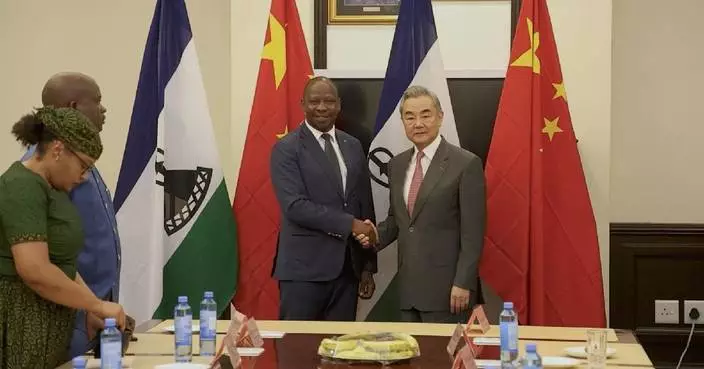
China, Lesotho elevate partnership to deepen trade, energy cooperation

Survivors still live in temporary houses 2 years after earthquake in Japan's Noto Peninsula

China's visa-free travel drives holiday tourism surge across China

China's Greater Bay Area attracts int'l enterprises, forging new tech hub

New giant panda couple makes public debut in Malaysia
Former US official denounces American military action against Venezuela as illegal, violation of international law

BP China Insight : Maduro Kidnapped—Lai Ching-te Immediately Withdraws Taiwan Independence Bill in Panic
Central Japan's Wajima continues slow path toward reconstruction 2 years after earthquake
UN chief calls for respect for international law in response to Trump’s remarks
Int'l politicians, scholar condemn Japanese PM's erroneous remarks on Taiwan

Anti-ICE nationwide protests in photos
China vows effective punishment against Taiwan separatists
Two years on, Japan's Noto Peninsula still struggles with earthquake recovery
Nationwide protests erupt in US after ICE shootings

Myanmar holds second round of voting in first general election since military takeover

Nepalese royalists demand monarchy restoration ahead of March elections
China, Lesotho elevate partnership to deepen trade, energy cooperation
Survivors still live in temporary houses 2 years after earthquake in Japan's Noto Peninsula
China's visa-free travel drives holiday tourism surge across China
China's Greater Bay Area attracts int'l enterprises, forging new tech hub
New giant panda couple makes public debut in Malaysia
Feature·Bloggers

【What Say You?】Trump’s “Maduro Grab” Gets a Glossy Spin by the Usual Suspects

【What Say You?】Trump's Judicial Theater: Maduro's Fate Already Sealed

【Deep Throat】Trump's Venezuelan Oil Grab: Big Oil Not Playing Along?

The Most Laughable Lie of the New Year: Jimmy Lai's "Grave Illness" Falls Apart Under Five Hard Facts

【What Say You?】Black Riots “comrades” Thought Ukraine Was Another “Resistance”—Then the Contract Hit

【Bastille Commentary】Green Nails? The Lie No Lawyer Would Touch

Former New Jersey acting governor Richard Codey dies at 79
- Minnesota braces for what's next amid immigration arrests and in the wake of Renee Good shooting
- Suspect arrested after a fire damages a historic Mississippi synagogue
- Reference to Trump's impeachments is removed from the display of his Smithsonian photo portrait
- Guard at Winter Olympic construction site dies in nighttime subfreezing temperatures
- First responders enter devastated Aleppo neighborhood after days of deadly fighting
- A $400,000 payout after Maduro's capture is putting prediction markets in the spotlight
- With Cuban ally Maduro ousted, Trump warns Havana to make a 'deal' before it's too late
- Hamas says it will dissolve its Gaza government when new Palestinian body takes over
- Torq Secures $140M Series D at $1.2B Valuation to Lead the AI SOC and Agentic AI Era

China, Lesotho to strengthen exchanges, advance cooperation
- Palestinian death toll in Gaza rises to 71,412: health authorities
- U.S. share of global economy hits lowest point since 1980: Russian media
- Iran swears to counterattack if attacked
- BRICS countries kick off joint maritime exercise in South Africa
- Chinese exhibitors present more cooperation opportunities at 2026 CES
- Inner Mongolia section of Yellow River enters stable ice period after 48 days
- Aerial footage records snowy Tianshan Mountains of Xinjiang
- Site in Sichuan wins UN award for outstanding protection of ecological, cultural heritage
- SCO demonstration area in coastal Qingdao reports expanding Europe-bound freight train services in 2025

Google teams up with Walmart and other retailers to enable shopping within Gemini AI chatbot
- Supermicro Announces Intelligent In-Store Retail Solutions in Collaboration with a Broad Range of Industry Partners
- GAC Magazine Battery and Solid-State Battery Win Top National Honor
- GAC's Quark Electric Drive Achieves the World's First DAkkS ASIL D Functional Safety and Information Security Dual Certification
- CATL Opens Middle East's Largest New Energy Aftermarket Facility in Riyadh
- SeaVerse Launches World's First AI Native Platform, "All in AI Native" Leads the Forward-Looking Revolution in AI Creation
- Etiqa’s Project Firefly Reinforces Mangrove Ecosystem in Sungai Panjang in Collaboration with Malaysian Nature Society
- BiLight Dazzles CES 2026: Flexible Perovskite PV Leads Green Tech Wave, Forges Global Partnerships
- USA Truck Returns to Private Ownership with Arkansas-Based UTAC, LLC, Positioned for Accelerated Growth
- GM hit with $6 billion in charges as EV incentives cut and emissions standards fade

Erich von Däniken, Swiss writer who spawned alien archaeology, dies at 90
- Germany sharply rejects RFK Jr.'s claims that it prosecutes doctors for vaccine exemptions
- How Olympians think about success and failure and what we can learn from them
- VR headsets are 'hope machines' inside California prisons, offering escape and practical experience
- Doctors say changes to US vaccine recommendations are confusing parents and could harm kids
- Strength training is crucial after menopause. How to make the most of your workouts
- Meta lines up massive supply of nuclear power to energize AI data centers
- From climbing vacuums to cyber pets: Some highlights of CES 2026
- Musk's Grok chatbot restricts image generation after global backlash to sexualized deepfakes
- Some flu measures decline, but it's not clear this severe season has peaked

Buddhist monks and their dog captivate Americans while walking for peace
- Andrea Bocelli will headline the Milan Cortina Winter Olympic opening ceremony
- The Golden Globes are tonight. Here's what to look for and how to watch and stream the show
- Grateful Dead founding member Bob Weir dies at 78
- Veteran actor T.K. Carter, known for 'The Thing' and 'Punky Brewster,' dies at 69
- Hollywood couple Meagan Good and Jonathan Majors gain Guinean citizenship
- Actor Timothy Busfield accused of child sex abuse in New Mexico
- Hollywood stars gather for an all-winners celebration at the American Film Institute Awards
- Laura Dave's sequel to 'The Last Thing He Told Me' reveals all
- Judge dismisses Salt-N-Pepa's lawsuit to reclaim master recordings from Universal Music Group

Bayern demolishes Wolfsburg 8-1 to go 11 points clear in Bundesliga
- US international Josh Sargent refused to play in FA Cup game, says Norwich coach
- Man United crashes out of the FA Cup after 2-1 loss to Brighton
- Inside the Numbers: How Indiana and Miami stack up going into CFP national championship game
- Panthers LT Ickey Ekwonu to miss significant time with ruptured patella tendon in right knee
- Avalanche run their home winning streak to 17 games, one away from matching franchise record
- Humphries Armbruster wins World Cup bobsled race, while Forgan and Kirkby lock up Olympic luge spot
- Lategan's late trouble gifts Dakar Rally stage seven to Ekström
- Virat Kohli hits 93 to lead India to 4-wicket win over New Zealand in first ODI
- IOC happy as new Milan Cortina hockey arena almost ready to welcome NHL players

No New Chikungunya Cases Reported in Hong Kong as Government Enhances Mosquito Control Measures
- Record turnout for Jockey Club Special Marathon to promote social inclusion
- Nestlé Hong Kong Recalls Additional Infant Formula Over Bacillus Cereus Contamination Concerns
- V Mart Opens at Victoria Park, Showcasing Cultural Arts and Pet-Friendly Events for Chinese New Year
- Hospital Authority Enhances Medical Fee Waiver Process for Financially Needy Patients
- Hong Kong reports no new chikungunya fever cases; ongoing mosquito control efforts continue in affected areas
- Woman Sentenced to Six Months for Smuggling Duty-Not-Paid Cigarettes in Hong Kong
- 18 Temporary Cold Shelters Opened Amid Severe Weather for Those in Need
- CHP Urges Vulnerable Groups to Take Precautions Against Cold Weather Health Risks
- Hong Kong Film Festival Launches in Copenhagen, Showcasing Local Cinema and Cultural Exchange

China's Huangpi Lake sees spectacular "Bird Wave" as winter migration peaks
- China’s ski resorts, ice rinks draw crowds as winter season peaks
- Xinjiang's Bosten Lake hosts thrilling ice sailing regatta to boost winter tourism
- Shanghai launches year-long global food festival in 2026
- Inbound, outbound passenger trips up 43.8 pct in northeast China's Heilongjiang
- Winter fishing festival kicks off at Hasuhai Lake in north China's Inner Mongolia
- Robotic traffic officer on duty in east China's Anhui
- J-35 fighter makes first flight of 2026
- AU Commission chief reiterates firm adherence to one-China principle
- Home-developed ton-class cargo drone completes maiden flight
Category · News

Former New Jersey acting governor Richard Codey dies at 79

Bayern demolishes Wolfsburg 8-1 to go 11 points clear in Bundesliga

Minnesota braces for what's next amid immigration arrests and in the wake of Renee Good shooting

Suspect arrested after a fire damages a historic Mississippi synagogue

US international Josh Sargent refused to play in FA Cup game, says Norwich coach

Man United crashes out of the FA Cup after 2-1 loss to Brighton

Google teams up with Walmart and other retailers to enable shopping within Gemini AI chatbot

Reference to Trump's impeachments is removed from the display of his Smithsonian photo portrait

Inside the Numbers: How Indiana and Miami stack up going into CFP national championship game

Panthers LT Ickey Ekwonu to miss significant time with ruptured patella tendon in right knee

Guard at Winter Olympic construction site dies in nighttime subfreezing temperatures

First responders enter devastated Aleppo neighborhood after days of deadly fighting

Avalanche run their home winning streak to 17 games, one away from matching franchise record

Humphries Armbruster wins World Cup bobsled race, while Forgan and Kirkby lock up Olympic luge spot
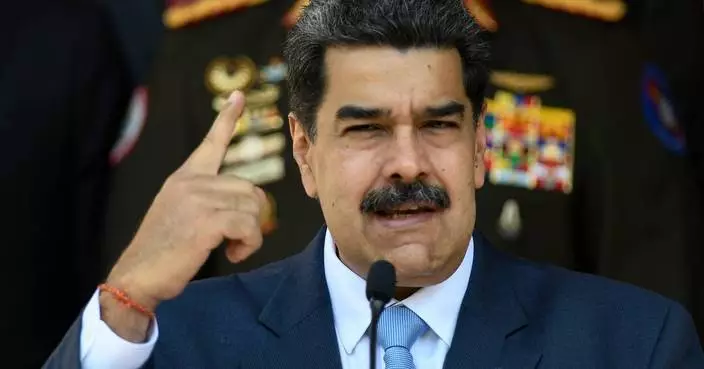
A $400,000 payout after Maduro's capture is putting prediction markets in the spotlight

Lategan's late trouble gifts Dakar Rally stage seven to Ekström
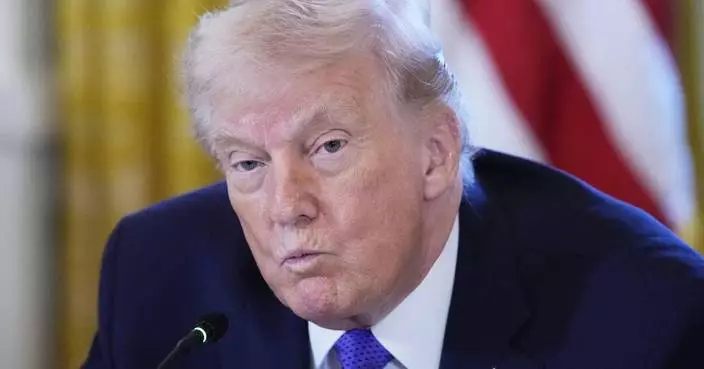
With Cuban ally Maduro ousted, Trump warns Havana to make a 'deal' before it's too late

Hamas says it will dissolve its Gaza government when new Palestinian body takes over

Torq Secures $140M Series D at $1.2B Valuation to Lead the AI SOC and Agentic AI Era

Thousands of tourists stranded in northern Finland as deep freeze halts flights

Virat Kohli hits 93 to lead India to 4-wicket win over New Zealand in first ODI

IOC happy as new Milan Cortina hockey arena almost ready to welcome NHL players
China, Lesotho to strengthen exchanges, advance cooperation

Settler violence in the Jordan Valley expels Palestinians from one of the few towns left standing

Liverpool defender Conor Bradley sustains significant knee injury
Palestinian death toll in Gaza rises to 71,412: health authorities

US international Ricardo Pepi out 2 months with broken arm but should recover in time for World Cup

Sabalenka wins Brisbane final amid frosty exchange with Kostyuk, Medvedev tops Nakashima

Ukrainian drone attack in Russia kills 1 following Moscow's intense bombardment

Erich von Däniken, Swiss writer who spawned alien archaeology, dies at 90

Poland overcomes Świątek defeat to Bencic and rallies to beat Switzerland in United Cup final

Iranian protests are growing. Israel is watching closely

Paco Rassat races to 2nd World Cup slalom win in breakout season ahead of Olympics

Supermicro Announces Intelligent In-Store Retail Solutions in Collaboration with a Broad Range of Industry Partners

Buddhist monks and their dog captivate Americans while walking for peace
U.S. share of global economy hits lowest point since 1980: Russian media

Husband charged in double homicide after having affair with au pair is going on trial in Virginia
Iran swears to counterattack if attacked
BRICS countries kick off joint maritime exercise in South Africa

Andrea Bocelli will headline the Milan Cortina Winter Olympic opening ceremony

Lawsuits by Trump allies could shape how the 2030 census is done and who will be counted

Pope Leo baptizes 20 infants in a tradition marking the end of the Christmas season

Transgender teen athlete in a Supreme Court fight knows the upcoming sports season could be her last

Germany sharply rejects RFK Jr.'s claims that it prosecutes doctors for vaccine exemptions
Chinese exhibitors present more cooperation opportunities at 2026 CES

How Olympians think about success and failure and what we can learn from them
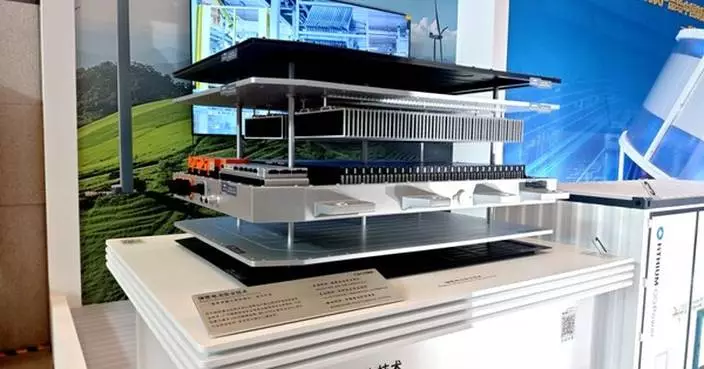
GAC Magazine Battery and Solid-State Battery Win Top National Honor

Braving the cold: Tokyo's New Year's ritual of ice baths, in photos

Milan’s Catholic archdiocese brings Olympic values into parish life
Inner Mongolia section of Yellow River enters stable ice period after 48 days
Aerial footage records snowy Tianshan Mountains of Xinjiang
Site in Sichuan wins UN award for outstanding protection of ecological, cultural heritage
SCO demonstration area in coastal Qingdao reports expanding Europe-bound freight train services in 2025
China’s ski resorts, ice rinks draw crowds as winter season peaks
China's Huangpi Lake sees spectacular "Bird Wave" as winter migration peaks
Xinjiang's Bosten Lake hosts thrilling ice sailing regatta to boost winter tourism
Shanghai launches year-long global food festival in 2026
Inbound, outbound passenger trips up 43.8 pct in northeast China's Heilongjiang
Winter fishing festival kicks off at Hasuhai Lake in north China's Inner Mongolia
Robotic traffic officer on duty in east China's Anhui

No New Chikungunya Cases Reported in Hong Kong as Government Enhances Mosquito Control Measures
OPEC faces new challenges if Venezuelan oil production rises: analyst
J-35 fighter makes first flight of 2026
AU Commission chief reiterates firm adherence to one-China principle
Home-developed ton-class cargo drone completes maiden flight

Lindsey Vonn's World Cup race canceled because of snowfall, wind gusts in Austria
Chinese tourists increasingly seek tailor-made experiences in Switzerland's winter tourism boom

6th-tier Macclesfield upsets FA Cup holder Crystal Palace in huge shock. Man City scores 10
HK outlines new strategy to be actively integrated into national development: official
AI innovations steal the spotlight at CES 2026 in Las Vegas
Yemen forms supreme military committee under Saudi-led coalition
Expanded drone utilization boosts low-altitude economy in China's Greater Bay Area
China's first zodiac-themed giant screen film "Horse Power" sets global premiere in Shanghai
Thousands rally in Aden supporting Southern Transitional Council
China's cargo drone completes maiden flight in Middle East
Protests in Venezuela demand release of Maduro couple
Shenzhou-21 astronauts conduct in-orbit training, advance experiments in multiple fields
Venezuela FM condemns U.S. travel alert as groundless
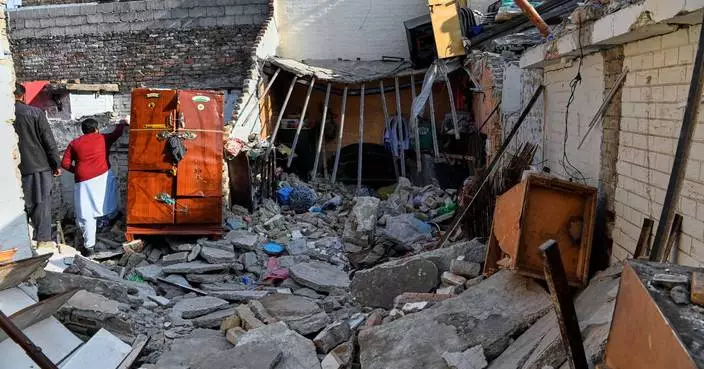
Bride and groom among 8 killed in gas cylinder blast at wedding in Pakistan’s capital
Protesters rally in Italy, Greece against U.S. military operation in Venezuela

GAC's Quark Electric Drive Achieves the World's First DAkkS ASIL D Functional Safety and Information Security Dual Certification
Protest erupts in Mexico City over US military operation in Venezuela

Bears linebacker T.J. Edwards to miss the rest of the season with leg injury
Chinese foreign minister arrives in Lesotho for visit








